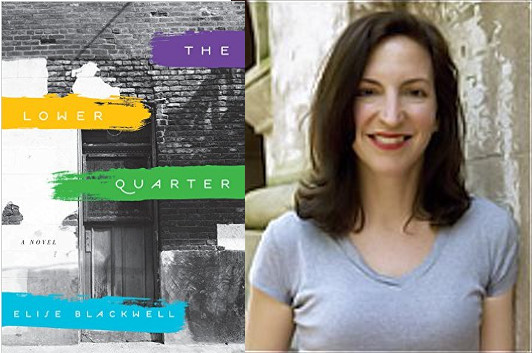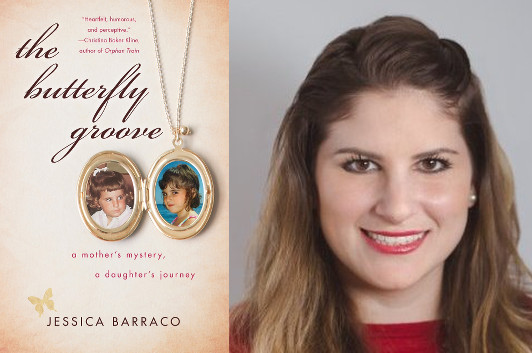Elise Blackwell: Two Writers, One House

photo via Elise Blackwell
I’ve been a fan of Elise Blackwell for years, even before we ran into each other at a literary festival in Montgomery a few years back. So I was glad to hear that she has a new novel—The Lower Quarter—out this fall, and delighted to be able to run this guest post where she talks about sharing a literary vocation with her husband, David Bajo.
When I finished the first novel I would publish, I showed it to my husband. He’s also a writer. I first fell in love with him through the obliquely romantic critiques he wrote for my short stories when we were both students in the same graduate fiction workshop—critiques that started with epigraphs from Kant or definitions of Zeno’s arrow. Which is to say: I care what he thought. I was nervous.
“I finished your book,” he said one morning about two days after I gave him the manuscript.I wanted the speed with which he read it to mean something, but the truth is that it was a very short novel and he’s a very early riser. I waited. Maybe I lifted my eyebrows, but mostly I waited what seemed like a very long time.
“You write very clearly,” he said. And that was all he said then.
Clarity is a desirable trait in prose, but I had been hoping for a word more along the lines of beautiful or moving or great, perhaps even perfect. I can hold a grudge, and more than a decade later I’m not above retelling this story when we argue or I’m just trying to get my way. I can be funny and self-deprecating; usually when I tell this story it’s a comedy and not a drama.
When I see a link to a story called something like “Ten Reasons Not to Date a Writer,” I always click the bait. I read and nod. Yes, we’ll see your most person experiences as material and, yes, we’re always criticizing the narrative structures of movies you’re enjoying. Put two writers together in a romantic relationship, and it can be a cesspool of subject theft, insecurity, and jealousy. The divorces are often ugly—all the more so for their brilliant articulation and even more so when they’re chronicled in print.
9 November 2015 | guest authors |
Jessica Barraco: Moving Through Motherless Milestones

photo via Jessica Barraco
As Jessica Barraco says in the book trailer to her memoir, The Butterfly Groove, she always knew who her mother was—but because her mother had died when Jessica was still a young girl, there were many unanswered questions about the past that had made her who she was… and that’s what Jessica set out to investigate. In this guest essay, she explains how she hasn’t just filled out her understanding of her mother’s life; she’s also gained a richer understanding of how her mother continues to be a presence in her own life.
One year for a birthday present, someone gave me a vintage album of my mom’s favorite song: “Cherry Bomb” by John Mellencamp. It was beautiful, and such a collector’s item. The original recording happened to take place during the year and month I was born: August of 1987. It was meant to be a sweet gesture, but the truth was, my heart sunk and my eyes filled with tears, and I couldn’t understand how such a nice gesture could make me feel so distraught. The whole next day, I learned a harsh reality to losing my mom at twelve years old: Every happy moment in my life will be bittersweet. No matter the joy, it will inevitably sink in that my mother will not be there to enjoy whatever it is with me; to see me grow, to watch me smile; and that no matter how you slice it, that is so very sad.
Always being an ambitious person both personally and professionally, I often pictured milestones: my first job, book release, wedding, birth of my children. And I can’t think of any of these moments without seeing the obligatory empty chair that my mom should be filling. The daily phone call I don’t get to make that so many others take for granted. The reassuring glance I have almost forgotten. I can get easily overwhelmed imagining any one of these moments.
My mom passed away sixteen years ago after suffering from cancer and its horrendous complications for nearly twenty years of her life, and for all of mine. I learned a lot about my mom while researching and writing The Butterfly Groove, but I was also able to imagine how she handled her own life’s milestones. I am comforted by now knowing the true series of events in her life that I wasn’t aware of previously. Along with the truth, I was fortune enough to learn how these experiences both inspired and influenced her choices: whether positively, negatively, or seemingly not at all. I call it learning the emotional genealogy of a person. I always knew where I came from, but I wanted to know from whom I came from.
2 November 2015 | guest authors |

 Our Endless and Proper Work is my new book with Belt Publishing about starting (and sticking to) a productive writing practice.
Our Endless and Proper Work is my new book with Belt Publishing about starting (and sticking to) a productive writing practice. 
